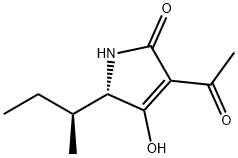| Melting point |
74.5°C |
| alpha |
20D -128° (c = 1.0 in methanol); -132 ± 2° (c = 0.5 in CHCl3) |
| Boiling point |
bp0.035 117° |
| Density |
1.1575 (rough estimate) |
| refractive index |
1.5480 (estimate) |
| storage temp. |
2-8°C |
| solubility |
Chloroform (Slightly), Methanol (Slightly) |
| pka |
4.50±1.00(Predicted) |
| form |
Solid |
| color |
Light yellow to brown |
| BRN |
3589518 |
| Stability |
Hygroscopic, Temperature Sensitive |
| Major Application |
cleaning products
cosmetics
food and beverages
personal care |
| InChI |
1S/C10H15NO3/c1-4-5(2)8-9(13)7(6(3)12)10(14)11-8/h5,8,13H,4H2,1-3H3,(H,11,14)/t5-,8-/m0/s1 |
| InChIKey |
CEIZFXOZIQNICU-XNCJUZBTSA-N |
| SMILES |
CC[C@H](C)[C@@H]1NC(=O)C(C(C)=O)=C1O |

